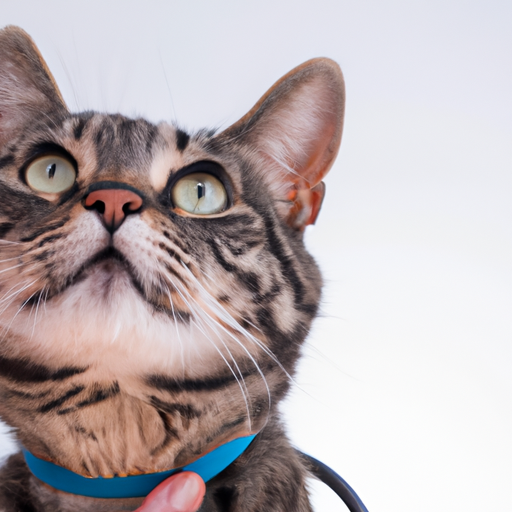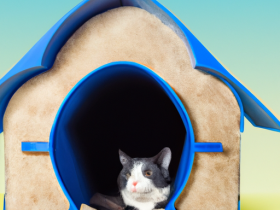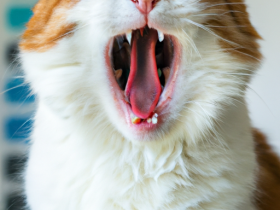“Cats Need Love and Care – Regular Vet Checkups Keep Them Healthy and Happy!”
Introduction
Cats are beloved members of the family, and it is important to ensure that they stay healthy and happy. Regular vet checkups are essential for cats, as they can help detect and prevent health issues before they become serious. Through regular checkups, cats can receive vaccinations, parasite prevention, and other treatments that can help keep them healthy and safe. Additionally, regular vet checkups can help identify any underlying health issues that may not be visible to the naked eye. By taking your cat to the vet regularly, you can ensure that your cat is receiving the best possible care and that any potential health issues are addressed quickly.
The Benefits of Regular Vet Checkups for Cats: Why It’s Important to Keep Your Cat Healthy
Cats are beloved companions, and it is important to keep them healthy and happy. Regular vet checkups are essential for cats, as they can help detect and prevent health issues before they become serious. Here are some of the benefits of regular vet checkups for cats.
First, regular vet checkups can help detect health issues early. Cats are masters of disguise when it comes to hiding illness, so it is important to have a professional examine them regularly. During a vet checkup, the vet will check your cat’s eyes, ears, teeth, and other areas for signs of illness or injury. This can help catch any issues early, before they become more serious.
Second, regular vet checkups can help prevent health issues. During a checkup, the vet can provide vaccinations and other preventive care to help keep your cat healthy. Vaccinations can help protect your cat from serious illnesses, such as rabies and feline leukemia. The vet can also provide advice on nutrition, exercise, and other lifestyle factors that can help keep your cat healthy.
Third, regular vet checkups can help build a relationship between you and your vet. This can be beneficial if your cat ever needs medical care. Your vet will be familiar with your cat’s medical history and can provide more personalized care.
Finally, regular vet checkups can help you stay on top of your cat’s health. You can ask questions and get advice from the vet on how to keep your cat healthy. This can help you make informed decisions about your cat’s care.
Overall, regular vet checkups are essential for cats. They can help detect and prevent health issues, build a relationship between you and your vet, and help you stay on top of your cat’s health. So, make sure to schedule regular vet checkups for your cat to keep them healthy and happy.
How to Prepare for a Vet Checkup for Your Cat: What to Expect and What to Bring
A vet checkup is an important part of keeping your cat healthy and happy. It is important to be prepared for the visit to ensure that your cat receives the best care possible. Here is what to expect and what to bring to a vet checkup for your cat.
What to Expect
At the vet checkup, your cat will receive a physical examination. The vet will check your cat’s eyes, ears, nose, and mouth, as well as their coat and skin. They will also check your cat’s weight and temperature. The vet may also perform a fecal exam to check for parasites. Depending on your cat’s age and health, the vet may also recommend additional tests, such as blood work or x-rays.
What to Bring
When you bring your cat to the vet, it is important to bring any medical records you have, such as vaccination records. You should also bring a list of any medications your cat is taking, as well as any supplements or vitamins. If your cat has any existing medical conditions, it is important to bring a list of their symptoms and any treatments they have received. Finally, it is a good idea to bring a few of your cat’s favorite treats to help keep them calm during the visit.
A vet checkup is an important part of keeping your cat healthy and happy. By being prepared for the visit and bringing the necessary items, you can ensure that your cat receives the best care possible.
The Value of Early Detection: How Regular Vet Checkups Can Help Identify Health Issues in Cats
Regular vet checkups are essential for cats to maintain their health and wellbeing. Early detection of health issues can help to prevent more serious problems from developing, and can even save a cat’s life. By scheduling regular vet visits, cat owners can ensure that their pet is receiving the best possible care.
During a vet checkup, the veterinarian will perform a physical examination of the cat. This includes checking the cat’s eyes, ears, nose, and mouth for any signs of infection or disease. The vet will also check the cat’s skin and fur for any signs of parasites or other skin conditions. The vet will also listen to the cat’s heart and lungs to check for any abnormalities.
The vet may also take blood and urine samples to check for any underlying health issues. These tests can help to detect diseases such as diabetes, kidney disease, and liver disease. They can also help to identify any infections or parasites that may be present.
In addition to the physical examination, the vet may also recommend other tests such as X-rays or ultrasounds. These tests can help to identify any internal problems that may not be visible during the physical exam.
Regular vet checkups can also help to identify any behavioral issues that may be present. The vet can provide advice on how to address any behavioral issues, such as aggression or anxiety.
By scheduling regular vet checkups, cat owners can ensure that their pet is receiving the best possible care. Early detection of health issues can help to prevent more serious problems from developing, and can even save a cat’s life. Regular vet visits are essential for cats to maintain their health and wellbeing.
The Role of Vaccinations in Cat Health: What Vaccines Are Recommended for Cats and Why
Vaccinations are an important part of cat health and are essential for protecting cats from a variety of diseases. Vaccines help to stimulate the cat’s immune system to produce antibodies that can fight off infections. Vaccines are recommended for cats to protect them from a variety of diseases, including feline distemper, feline leukemia, and rabies.
Feline distemper is a highly contagious virus that can cause severe respiratory and gastrointestinal illness in cats. Vaccination is the best way to protect cats from this virus. The vaccine is typically given in two doses, with the first dose given at 8-10 weeks of age and the second dose given at 12-14 weeks of age. Booster shots are then recommended every one to three years, depending on the vaccine used.
Feline leukemia is a virus that can cause a variety of serious health problems in cats, including anemia, cancer, and immune system suppression. Vaccination is the best way to protect cats from this virus. The vaccine is typically given in two doses, with the first dose given at 8-10 weeks of age and the second dose given at 12-14 weeks of age. Booster shots are then recommended every one to three years, depending on the vaccine used.
Rabies is a virus that can be fatal to cats and other animals. Vaccination is the best way to protect cats from this virus. The vaccine is typically given in one dose, with the first dose given at 12-14 weeks of age. Booster shots are then recommended every one to three years, depending on the vaccine used.
In addition to the above vaccines, cats may also benefit from other vaccines, such as those for feline infectious peritonitis, feline calicivirus, and feline herpesvirus. Vaccines for these diseases are typically given in two doses, with the first dose given at 8-10 weeks of age and the second dose given at 12-14 weeks of age. Booster shots are then recommended every one to three years, depending on the vaccine used.
Overall, vaccinations are an important part of cat health and are essential for protecting cats from a variety of diseases. Vaccines help to stimulate the cat’s immune system to produce antibodies that can fight off infections. Vaccines are recommended for cats to protect them from a variety of diseases, including feline distemper, feline leukemia, and rabies, as well as other diseases such as feline infectious peritonitis, feline calicivirus, and feline herpesvirus. Booster shots are then recommended every one to three years, depending on the vaccine used.
The Benefits of Regular Dental Care for Cats: How to Keep Your Cat’s Teeth and Gums Healthy
Regular dental care is essential for cats to maintain healthy teeth and gums. Without proper dental care, cats can suffer from a variety of dental problems, including gum disease, tooth decay, and even tooth loss. Fortunately, there are several steps that pet owners can take to ensure their cats receive the dental care they need.
The first step in providing regular dental care for cats is to brush their teeth. Brushing your cat’s teeth on a daily basis is the best way to remove plaque and tartar buildup, which can lead to gum disease and tooth decay. It is important to use a toothbrush specifically designed for cats, as well as a toothpaste that is formulated for cats. Additionally, it is important to use a gentle brushing technique to avoid irritating your cat’s gums.
In addition to brushing, it is important to provide your cat with regular dental checkups. During these checkups, your veterinarian will be able to identify any potential dental problems and provide treatment if necessary. Additionally, your veterinarian may recommend a professional dental cleaning, which can help to remove plaque and tartar buildup that brushing alone cannot remove.
Finally, it is important to provide your cat with a balanced diet that includes crunchy foods. Crunchy foods help to remove plaque and tartar buildup, as well as stimulate the gums. Additionally, it is important to provide your cat with plenty of fresh water to help keep their mouth clean and healthy.
By following these steps, pet owners can help ensure their cats receive the dental care they need to maintain healthy teeth and gums. Regular dental care is essential for cats, and can help to prevent a variety of dental problems. With proper care, cats can enjoy a healthy and happy life.
Q&A
Q1: Why is it important to take my cat to the vet for regular checkups?
A1: Regular vet checkups are important for cats because they can help detect and prevent health problems before they become serious. Regular checkups can also help identify any underlying issues that may be causing your cat discomfort or distress. Additionally, regular checkups can help ensure that your cat is up-to-date on vaccinations and other preventative care.
Q2: How often should I take my cat to the vet for a checkup?
A2: Generally, cats should have a checkup at least once a year. However, if your cat is a senior or has any existing health issues, your vet may recommend more frequent visits.
Q3: What should I expect during a regular vet checkup?
A3: During a regular vet checkup, your vet will likely perform a physical exam, check your cat’s weight, and take their temperature. Your vet may also check your cat’s eyes, ears, and mouth for any signs of infection or disease. Additionally, your vet may recommend blood tests or other diagnostic tests to check for any underlying health issues.
Q4: What should I bring to my cat’s vet checkup?
A4: When taking your cat to the vet for a checkup, it’s important to bring any medical records you have, including vaccination records. Additionally, it’s helpful to bring a list of any medications your cat is taking, as well as any questions or concerns you may have about your cat’s health.
Q5: What should I do if I notice any changes in my cat’s behavior or health between checkups?
A5: If you notice any changes in your cat’s behavior or health between checkups, it’s important to contact your vet right away. Your vet can help determine if the changes are normal or if they may indicate a more serious health issue.
Conclusion
In conclusion, regular vet checkups are essential for cats to ensure their health and wellbeing. Regular checkups allow for early detection of any health issues, which can help to prevent more serious illnesses from developing. Additionally, regular checkups provide an opportunity for cats to receive vaccinations and other preventative care, which can help to keep them healthy and safe. Ultimately, regular vet checkups are an important part of responsible cat ownership and should not be overlooked.








Leave a Reply
View Comments